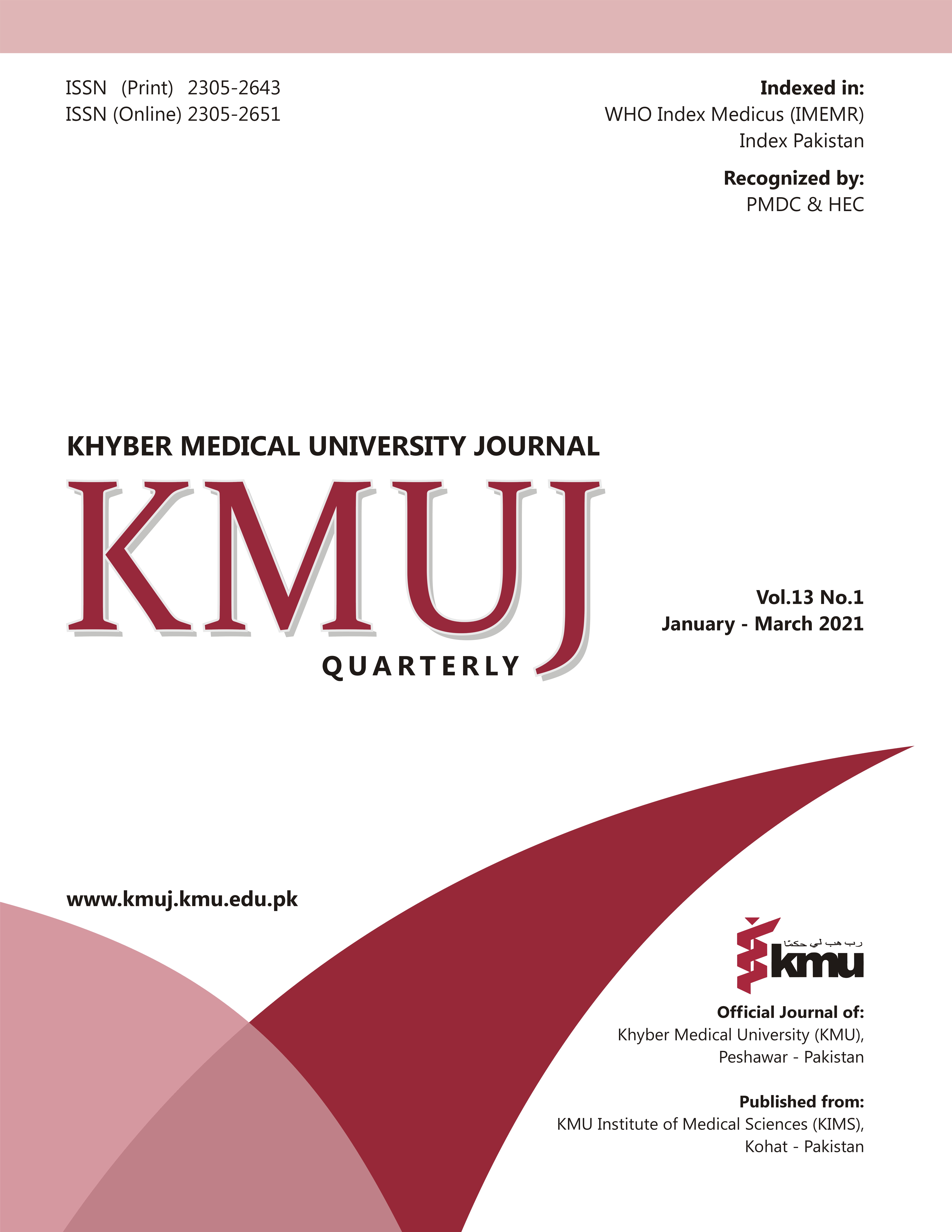PSYCHOLOGICAL DISTRESS AND MENTAL WELL-BEING AMONG DOCTORS WORKING IN MAJOR TEACHING HOSPITALS OF PESHAWAR, PAKISTAN
Main Article Content
Abstract
OBJECTIVES: To find out the relationship between psychological distress and mental well-being among doctors working in teaching hospitals of Peshawar, Pakistan; and explore the gender related differences on psychological distress and mental well-being among these doctors.
METHODS: This cross-sectional study was conducted on 270 doctors working in Khyber Teaching Hospital, (KTH), Lady Reading Hospital (LRH), and Hayatabad Medical Complex (HMC) Peshawar, Pakistan. Data was collected through convenient sampling technique. Two reliable and valid questionnaires, Kessler Psychological Distress Scale (K10) and Warwick-Edinburgh Mental Well-Being Scale were used t measure psychological distress and mental well-being among doctors. Data analysis was done through SPSS-21v.
RESULTS: Out of 270 doctors, 154 (53.1%) were male and 116 (40.0%) were female doctors. Majority of doctors (n=134; 46.2%) were from KTH, followed by HMC (n=70; 24.1%) and LRH (n=66; 22.8%). Overall descriptives indicates that data was normally distributed and alpha values of both scales were (K-10; α= 0.78 and MWB; α=0.86). Both psychological distress and mental well-being were negatively correlated with each other (-0.62** p <0.01). Findings Also showed that female doctors had more Psychological distress than male doctors (t=4.09).
CONCLUSION: Psychological distress and mental well-being among doctors working in major teaching hospitals of Peshawar Pakistan were negatively correlated with each other. Female doctors reported higher psychological distress as compared to male doctors.
Article Details
Work published in KMUJ is licensed under a
Creative Commons Attribution 4.0 License
Authors are permitted and encouraged to post their work online (e.g., in institutional repositories or on their website) prior to and during the submission process, as it can lead to productive exchanges, as well as earlier and greater citation of published work.
(e.g., in institutional repositories or on their website) prior to and during the submission process, as it can lead to productive exchanges, as well as earlier and greater citation of published work.
References
Mavroforou A, Giannoukas A, Michalodimitrakis E. Alcohol and drug abuse among doctors. Med Law. 2006;25:611–25.
Shanafelt TD, Boone S, Tan L, Dyrbye LN, Sotile W, Satele D, et al. Burnout and satisfaction with work-life balance among US physicians relative to the general US population. Arch Intern Med. . 2012 Oct 8;172(18):1377-85. DOI: 10.1001/archinternmed.2012.3199.
World Health Organization [WHO]. Investing in mental health. Geneva, Switzerland; 2003.
Health and Safety Executive. Tackling Work-related Stress, HSE Books, London; 2001.
Cooper CL, Dewe PJ, O’Driscoll MP. Organizational stress: A review and critique of theory, research and applications. Sage Publications, CA: 2001.
Burke RJ, Moodie S, Dolan SL, Fikesbaum L. Job demands, social support, work-satisfaction and psychological well-being among nurses in Spain. Esade Working Paper 2012;233:60-2. DOI: 10.2139/ssrn.2117051.
Madhuchandra MK, Srimathi NL. Psychological Well-being among Doctors and Nurses: A Comparative Study. Int J Indian Psychol 2016;3(4):203-10.
Atif K, Khan HU, Ullah MZ, Shah FS, Latif A. Prevalence of anxiety and depression among doctors; the unscreened and undiagnosed clientele in Lahore, Pakistan. Pak J Med Sci. 2016 Mar-Apr;32(2):294-8. doi: 10.12669/pjms.322.8731.
Kessler RC, Andrews G, Colpe LJ, Hiripi E, Mroczek DK, Normand SLT, et al. Short screening scales to monitor population prevalence and trends in non-specific psychological distress. Psychological Medicine 2002; 32(6):959-6. DOI: 10.1017/s0033291702006074.
Tennant R, Hiller L, Fishwick R, Platt S, Joseph S, Weich S, et al. The Warwick-Edinburgh Mental Well-being Scale (WEMWBS): development and UK validation. Health Quality Life Outcomes 2007;5:63. DOI: 10.1186/1477-7525-5-63.
Nunnally JC, Bernstein IH. The assessment of reliability. Psychometric Theory New York: McGraw Hill, 3rd ed, 2003.
Nazir N, Hussain A, Tanveer F, Subhan Ullah, Khokar M, Sabri AA. Correlation of perceived stress and psychological well-being among doctors serving at various government and private hospitals of Faisalabad. Rawal Med J 2020; 45(4):886-9.
Grover S, Sahoo S, Bhalla A, Avasthi A. Psychological problems and burnout among medical professionals of a tertiary care hospital of North India: A cross-sectional study. Indian J Psychiatry 2018; 60(2): 175–188. DOI: 10.4103/psychiatry.IndianJPsychiatry_254_17
Wall DT, Bolden R, Borrill CS, West AM. Psychiatric disorder in NHS trust staff: Occupational and gender differences. Br J Psychiatry 1998; 171(6):519-23 DOI:10.1192/bjp.171.6.519.
